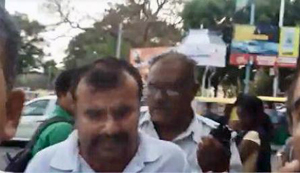Bengaluru, Apr 13: A sub-inspector of police and a constable attached to Shivajinagar traffic police station suffered injuries after they were attacked by a group of armymen as they were fined for violating traffic norm at BRV Junction on Tuesday.
Krishnamurthy, the SI and Sudheendra N (in pic), the constable, were rushed to Bowring Hospital for treatment of internal injuries, said the police.
Senior officers from the police and army visited the spot and hospital and discussed the incident in detail. The police have decided to furnish a copy of the investigation report to the army higher-ups for action from their end. The police have also decided to enclose video footage of the attack on the cops on duty, said the police.
The incident took place when Krishnamurthy and Sudheendra were on duty at BRV junction around 5.30 pm. Krishnamurthy noticed two men riding a bike on the one-way road. He stopped them and asked them to pay fine of Rs 100. K P Singh, the pillion rider, who was drunk, paid the fine and went away along with the rider, said the police.
Within minutes, Singh and a group of around 25 armymen returned and began an argument with Krishnamurthy for peanalising an armyman. In the melee, Singh slapped Krishnamurthy who sent a wireless message seeking assistance. Cops rushed to the spot, bundled up Singh in Hoysala vehicle and took him to the Commercial Street police station, said the police. Other armymen went back only to return with more men and assault Sudheendra. Upon receiving the information, senior police officers rushed to the spot and dispersed the armymen. They also informed the army higher-ups who rushed to the spot.
One of the armymen was a commissioned officer, but he did not stop others from assaulting a cop on duty. The army higher-ups have assured action from their end for attacking a public servant on duty. A case has been registered with Commercial Street police.









Comments
So How did people share on social media - \Film Stars get likes, How many likes for Army men..\" , \"1 Like - 1 Respect\".. etc..
Share this too. Let the country know the behavior of our well disciplined Army."
How can they protect the country when they themselves not know what is wrong and right.
Add new comment